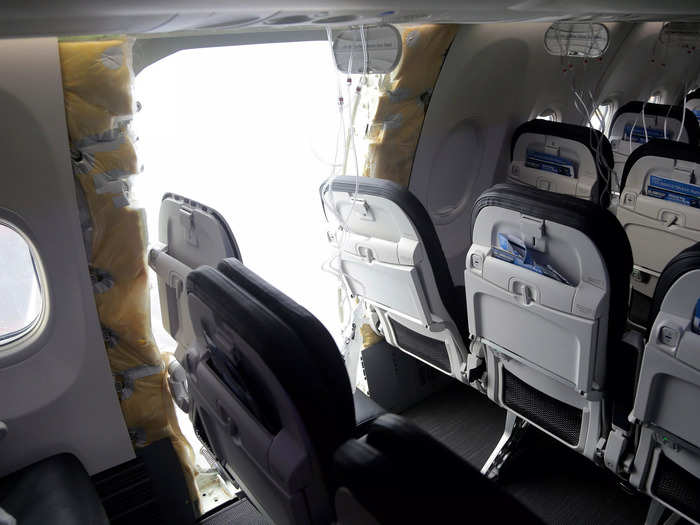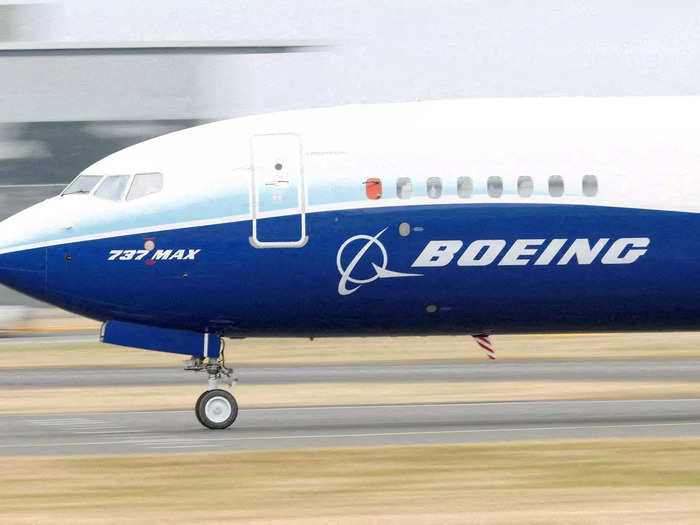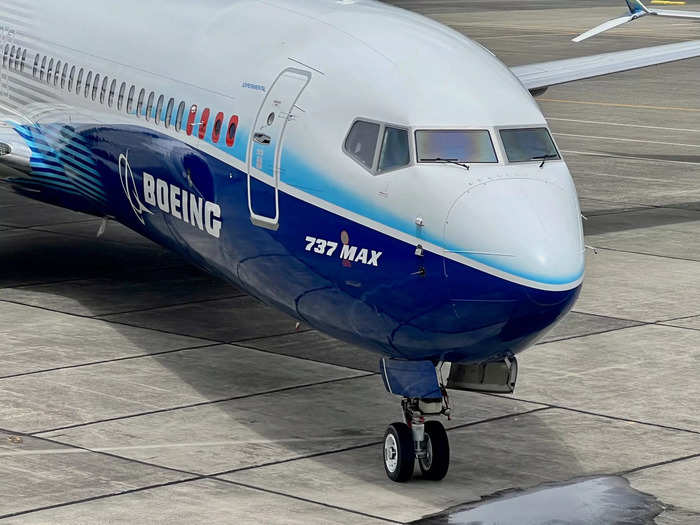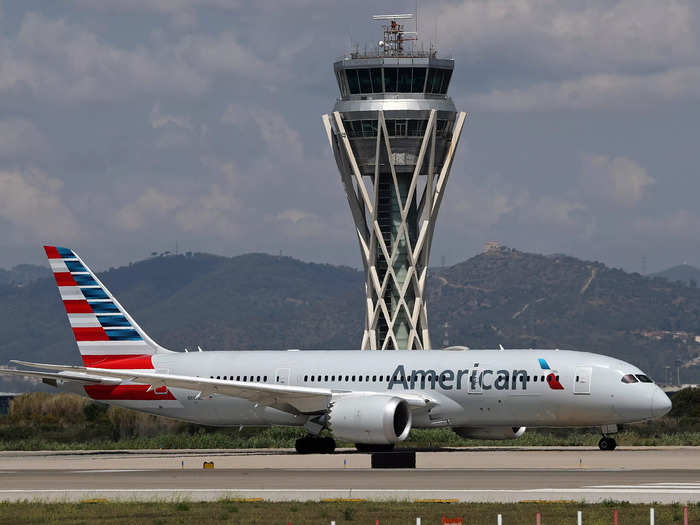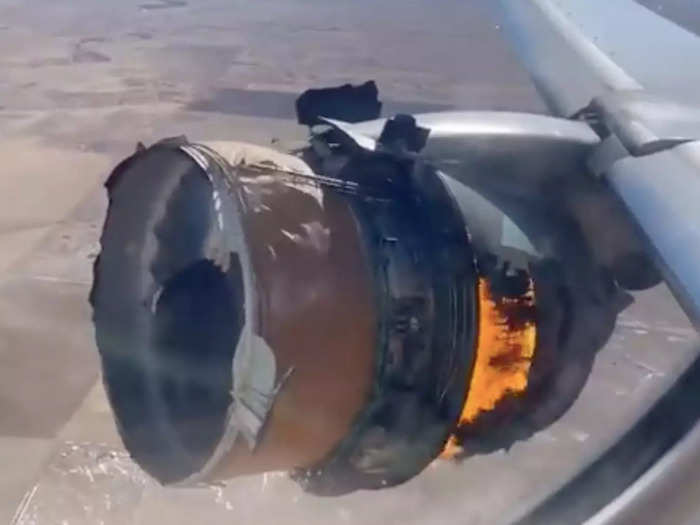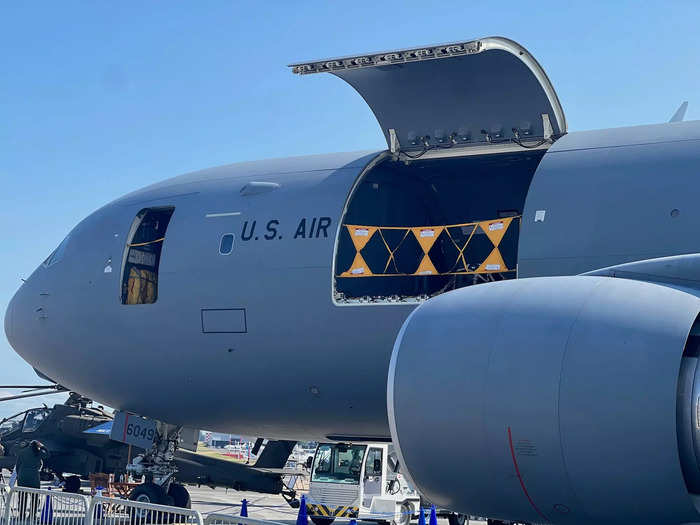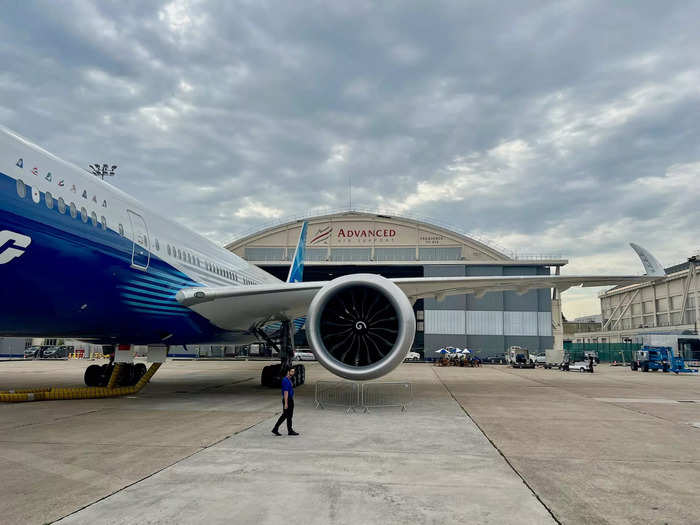An Alaska Airlines Boeing 737 Max 9 sits parked after an emergency landing over a door plug blowing out midflight. National Transportation Safety Board
- Boeing has been thrust into the spotlight again, and not in a good way.
- One of its planes made an emergency landing because a door plug flew off midflight.
A terrifying fuselage blowout on a Boeing 737 Max 9 plane on Friday has refreshed fears about the jet's safety, just a few years after the previous version of the plane was cleared to fly again following two deadly crashes.
Emirates' president, Tim Clark, said the incident pointed to a pattern of issues at Boeing going back many years.
"They've had quality-control problems for a long time now, and this is just another manifestation of that," Clark told Bloomberg in a report published Monday. "I think they're getting their act together now, but this doesn't help."
Here's a short list of some of the quality-control headaches and public-relations crises Boeing has endured:
737 Max 9 blowout
A gaping hole where the paneled-over door had been on Alaska Airlines Flight 1282. National Transportation Safety Board via AP
Safety regulators are investigating how a door plug blew out late Friday on an Alaska Airlines flight that took off from Portland, Oregon. Regulators on Saturday grounded 171 planes in the US, which mostly affected Alaska and United airlines. There are 215 of the single-aisle Max 9 jets in service around the world, Reuters reported.
The Federal Aviation Administration's Emergency Airworthiness Directive requires these aircraft to be inspected before they can return to the air. Each inspection will take four to eight hours, the FAA said.
Boeing has said it supports the FAA's grounding and investigation. Boeing's CEO, Dave Calhoun, on Tuesday hosted an all-hands meeting with employees.
"We're going to approach this number one acknowledging our mistake," Calhoun said at a 737 Max factory in Washington, according to multiple media outlets such as CNN and Bloomberg. "We're going to approach it with 100% and complete transparency every step of the way."
Less than two weeks before that episode, Boeing had asked airlines to inspect all its 737 Max planes for loose bolts. Boeing issued the directive after an airline found a bolt with a missing nut in one jet and a loose bolt in another.
737 Max crashes
Hundreds of 737 Max aircraft were grounded for nearly two years while Boeing fixed issues with the plane's software. Peter Cziborra/Reuters
Boeing made the first deliveries of the 737 Max, an update to the 737 jet, in 2017. Two years later, hundreds of Max planes were grounded worldwide after two separate crashes killed 346 people.
The first crash was in October 2018 in Indonesia and involved a Lion Air Max 8, a Max variant different from the Max 9. Five months later, an Ethiopian Airlines Max 8 crashed in Ethiopia.
Inspectors later found a fault in the Maneuvering Characteristics Augmentation System, which was designed to automatically keep the plane's nose down if it detected an imbalance.
Investigators determined that a sensor on the flight-control system was responsible for the deadly crashes because it gave erroneous data to the plane, triggering a stall alert and pushing the Max's nose down.
Importantly, the Justice Department found that Boeing had not revealed the MCAS's existence to operators or pilots.
Because the pilots were unaware of what was causing the pitch down, neither the Lion Air nor the Ethiopian flight crew knew how to shut down the system, which would have been a multistep process.
By March 2019, Boeing unveiled a software update to avoid MCAS bugs and submitted the proposal to regulators.
Boeing later suspended production of the jet for five months starting in January 2020.
The plane was eventually recertified — meaning it could legally fly passengers — in late 2020, and the FAA lifted its grounding order following changes to the faulty MCAS, updated wiring, and new pilot training.
Waiver requests for uncertified Max 7 and Max 10
The Boeing 737 Max 10. Taylor Rains/Insider
Boeing has two variants of its Max family that have yet to be certified — the Max 7 and the Max 10.
In both processes, Boeing has asked for exemptions to safety standards that went into effect last year. For the Max 10, this included the exclusion of updates that would add a crew alert system to the cockpit.
Boeing was granted the waiver in the 11th hour of December 2022, which was a win for the planemaker because it meant current Max pilots could jump between the variants without extra training.
The exemption did come with a catch, though — Boeing has to retrofit every Max variant with the updated safety systems three years after the Max 10 is certified. This maintains the commonality Boeing desperately needs to sell the Max family.
The Max 7 has also faced issues. Recently, Boeing asked for a waiver related to the uncertified jet's engine inlets and anti-ice systems through May 2026. Until then, Max pilots would be asked to limit the systems' use.
787 quality-control issues
A Boeing 787-8 Dreamliner American Airlines plane. NurPhoto / Getty
In 2019, Boeing inspectors found paper-thin gaps in its 787 Dreamliner's fuselage, and the company grounded eight of the planes. Over the next three years, Boeing was forced to pause deliveries of its 787 Dreamliner three times.
A backlog of orders piled up during the pauses. The company has said it plans to increase Dreamliner production by 2026 to 10 planes monthly, from about five a month as of October. Last year, it delivered 73 planes in total.
But Boeing won't be allowed to self-certify its planes as safe to fly — a practice the FAA revoked after the 737 Max crashes.
777 engine failure
The engine of a United Airlines Boeing 777 plane. YouTube/9News
Some Boeing 777 planes powered by certain Pratt & Whitney engines were briefly grounded in 2021 after one of the 777-200s experienced an engine failure while flying from Denver to Hawaii.
The incident made headlines after part of an engine fell into a suburban Colorado neighborhood. It caused no injuries on the ground or to any passengers.
The National Transportation Safety Board later said a crack in the Pratt & Whitney engine's fan blade caused the failure and blamed, in part, "inadequate inspections."
The inspections "failed to identify low-level indications of cracking, and the insufficient frequency of the manufacturer's inspection intervals, which permitted the low-level crack indications to propagate undetected," the NTSB said in a 2021 report.
Costly delays for Air Force's KC-46 Pegasus
A KC-46 Pegasus aircraft. Taylor Rains/Insider
In 2011, Boeing won a bid to build a massive new tanker aircraft for the US Air Force, known as the KC-46 Pegasus. It's a conversion of its 767 airliners that can refuel other planes in midair, and it has been plagued with delays.
Issues with the refueling boom and fuel tank have added up to costly delays and financial losses totaling about $7 billion as of early 2023.
"The good news is we understand it, and we're progressing through that rework," Boeing's Calhoun said in April. "On the operational side, the tanker is continuing to perform its mission well."
By October, the company had delivered 77 of the planes.
5-year Boeing 777X delay
Taylor Rains/Insider
The Boeing 777X — famous for its folding wingtips — is the latest commercial airliner from the planemaker, expected to enter service in 2025.
The jet is set to become the world's largest twin-engine passenger plane once it hits the market, but it has had its fair share of struggles as its "abnormal production costs" reach $1 billion.
The program has already been delayed at least five years from its initial 2020 entry, partially due to the pandemic, prompting Clark, Emirates' president, to voice concern in 2021 about the delivery timeline and take a jab at Boeing leadership.
"Culpability for the culture, strategy, direction, priority of that company rests with the Boeing board and nobody else," he told The Air Current, commenting on the quality-control and safety issues of the 787, 737 Max, and 777X. "And that's where the buck should stop. And that's where they need to get themselves sorted out."

